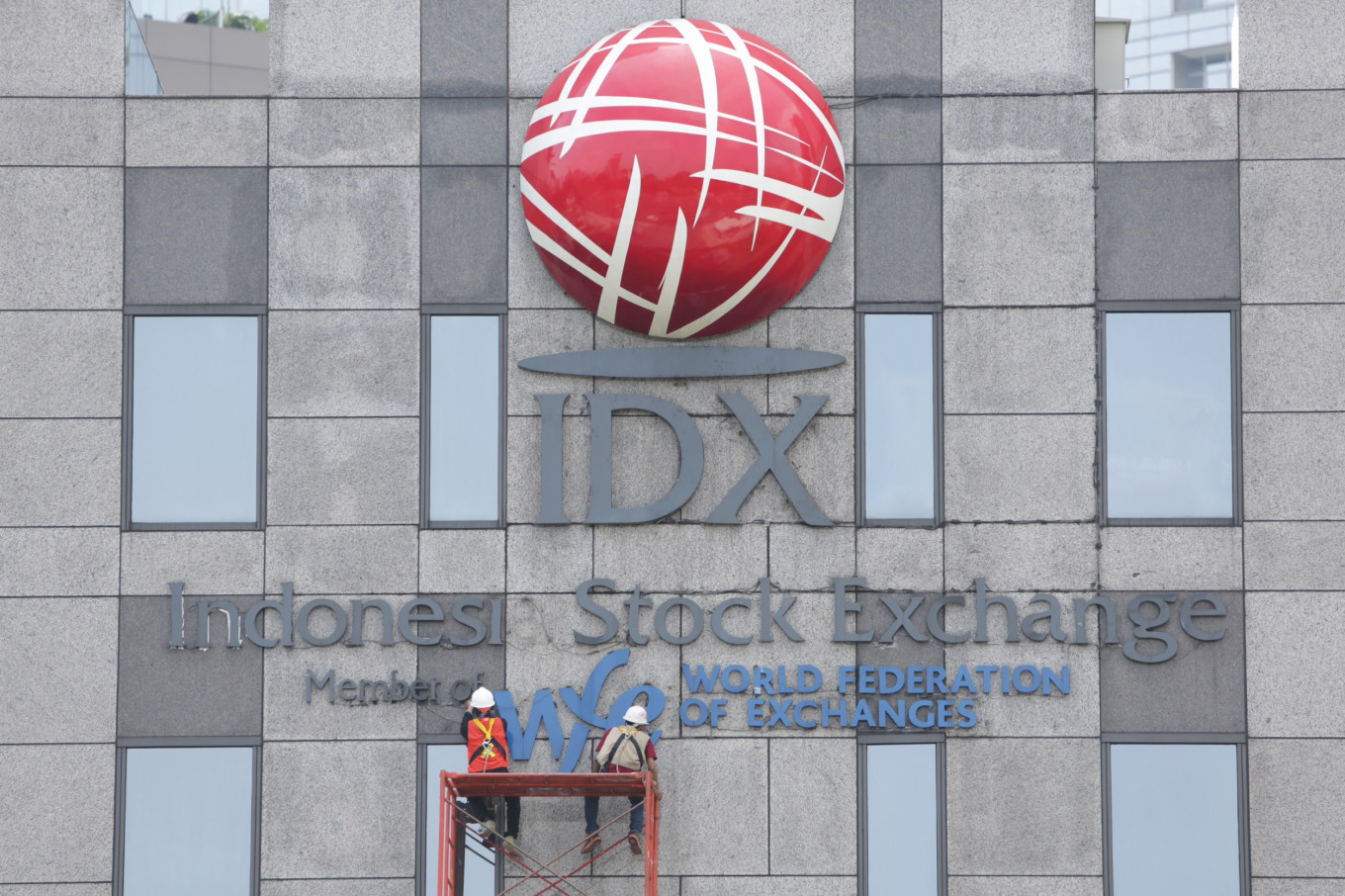Popular Reads
Top Results
Can't find what you're looking for?
View all search resultsPopular Reads
Top Results
Can't find what you're looking for?
View all search resultsBanking stocks to lead Indonesian bourse recovery, experts say
The finance sector, under which banking stocks are grouped on the Indonesia Stock Exchange (IDX), has lost 19.31 percent of its value so far this year, the fourth-best performer on the bourse, while the JCI plunged 19.82 percent during the period.
Change text size
Gift Premium Articles
to Anyone
T
he benchmark Jakarta Composite Index (JCI) recovery will depend on the performance of banking stocks, analysts have said, while reports have shown that banks will continue to face challenges navigating a volatile COVID-19-driven environment.
“The JCI [recovery] will depend on the banking sector,” Jemmy Paul Wawointana, president director of Sucor Asset Management, whose assets under management (AUM) stood at Rp 11.6 trillion (US$791.37 million) as of June, said during a webinar on July 14.
“The financial [sector] makes up almost 40 percent of the index’s market capitalization,” he added.
The finance sector, under which banking stocks are grouped on the Indonesia Stock Exchange (IDX), has lost 19.31 percent of its value so far this year, the fourth-best performer on the bourse, while the JCI plunged 19.82 percent during the period.
The economic uncertainties caused by the COVID-19 pandemic have led investors to dump risky assets and resort to safe havens. Stocks markets in emerging economies, such as Indonesia, have seen hefty capital outflows since March.
The Indonesian bourse market capitalization had depleted to Rp 5.85 quadrillion as of Monday from Rp 7.26 quadrillion at the end of last year as foreign investors dumped Rp 17.16 trillion worth of stocks more than they bought so far this year, according to IDX data.
“But by looking at the valuation [of the banking stocks] and by them having the biggest market capitalization, they should be the first option for foreign investors when reentering Indonesia,” Jemmy said.
Indonesian banks, he went on to say, had shown better development in terms of net profits and net interest margin (NIM) in the past five to 10 years compared with banks in the United States and China, making Indonesian banks attractive assets for global investors to invest in.
Banks in the US and China booked on average an NIM of 2.5 percent, while Indonesian banks recorded an average of 3.5 to 4 percent, which indicates higher profitability.
However, he acknowledged that this profit margin could potentially fall to a level of 3 percent as a result of the pandemic as Indonesian banks’ net profit growth slowed, even contracted, during this year’s first quarter.
The country’s largest bank by asset value, state-owned Bank Rakyat Indonesia, saw a 0.3 percent annual contraction in its net profits to Rp 8.17 trillion in this year’s first three months. Indonesia’s largest private bank, Bank Central Asia (BCA), recorded net profit growth of 8.6 percent yoy in the period, lower than the 10.1 percent growth booked in the first quarter of last year.
In a research note published on May 29, Moody’s Investors Service financial institutions group analyst Tengfu Li wrote that Indonesian banks would see their asset quality and profitability deteriorate because of the coronavirus, but their capital and liquidity would remain strong, providing ample buffers to absorb the financial stress.
Mirae Asset Sekuritas Indonesia expressed a similar view to Jemmy, saying the JCI gain of 3.2 percent month-on-month (mom) in June was mainly propped up by a rebound in the finance sector.
“The finance sector increased by 10.1 percent mom, supported by the better results from the top-four banks because of rising optimism that the relaxation of the large-scale social restrictions marked Indonesia’s passing of the hardest blow to its economy,” Mirae analysts Hariyanto Wijaya and Emma A Fauni wrote in a report published on July 12.
“And as the market begins to price in the recovery in the coming quarters, banks are perceived to be among the sectors that might recover most quickly,” the report says.
Mirae Asset Sekuritas has revised its end-of-year JCI target to 5,400 from its previous 5,180.
“Although there should be high volatility in the JCI during its recovery, we think the recent recovery should be sustainable, and the March level of the JCI at 3,937 should be the rock bottom for the JCI in 2020,” the report reads.
The JCI slipped 0.56 percent on Monday to 5,051.11 dragged down by drops in the stock prices of BRI, diversified conglomerate PT Astra International and state-owned Bank Mandiri.
Jemmy forecast the JCI would close at 5,500 this year, propped up by local investors as opposed to foreign ones.










